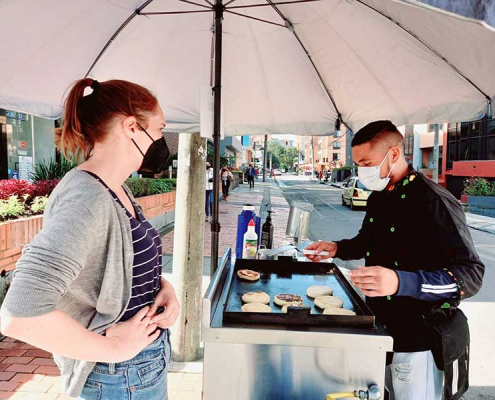Tag Archive for: Grammar

What does “me regala” mean in Colombian Spanish?
Colombian SpanishAll Spanish speakers use the verb "regalar" to give something for free or as a present, but what is the Colombian way of using this verb, and why should you learn it?

How learning about Colombian culture can help you improve your Spanish communication skills
Colombian SpanishWant to speak Colombian Spanish without sounding too formal? Take the time to familiarize yourself with the Colombian culture and see how it can help your communication skills.

Vaina, the most used and versatile Colombian word
Colombian SpanishThe word "vaina" is such an important part of the Colombian lexicon. It's a word we use daily; it's simple and complex at the same time, so it deserves an entire article!

20 words that only make sense in Colombia
Colombian SpanishAre you "amañado" in Colombia? It's time to know some of the unique Colombian Spanish expressions and explain what they mean.

I love you in Spanish: Different levels of love, from “Te quiero” to “Te amo”
Colombian SpanishIf you want to tell someone you love them in Spanish, what would you say "te amo" or "te quiero"? What is the difference between the two verbs?

All you need to know to flirt and date with Colombians
Colombian SpanishLooking for some expert flirting tips? We've got you covered. Here's everything you need to know to flirt and date Colombians.

Tips for mastering Spanish gender
Colombian SpanishConfused about the gender of Spanish nouns? Don't be! Learn the rules to help you know whether a word is masculine or feminine!

False friends: Spanish/English false cognates
Colombian SpanishFind out what false friends in linguistics are, and which of these 'friends' you need to avoid as an English speaker learning Spanish.

7 tips for perfect Colombian Spanish pronunciation
Colombian SpanishWorking on your Spanish pronunciation skills is definitely worth the effort. Use these strategies to make learning easier.

Does Colombia have the best Spanish?
Colombian SpanishWhy Colombian Spanish is considered one of the easiest accents to understant and why is gaining the popularity of being "the world’s best"?

